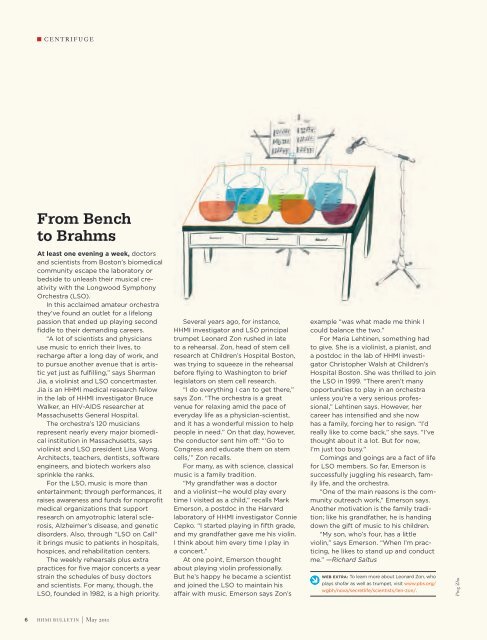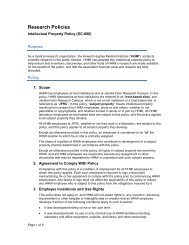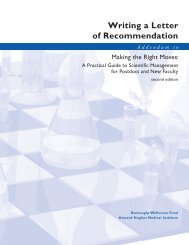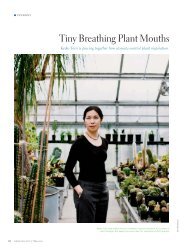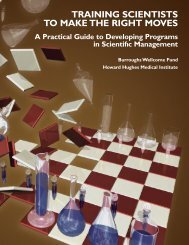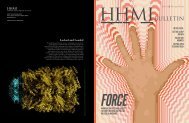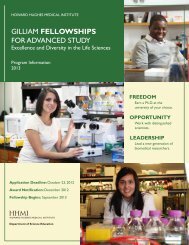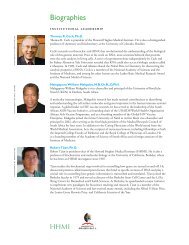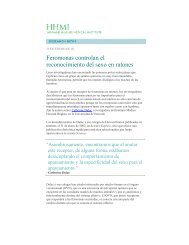Download PDF - Howard Hughes Medical Institute
Download PDF - Howard Hughes Medical Institute
Download PDF - Howard Hughes Medical Institute
Create successful ePaper yourself
Turn your PDF publications into a flip-book with our unique Google optimized e-Paper software.
centrifuge<br />
From Bench<br />
to Brahms<br />
At least one evening a week, doctors<br />
and scientists from Boston’s biomedical<br />
community escape the laboratory or<br />
bedside to unleash their musical creativity<br />
with the Longwood Symphony<br />
Orchestra (LSO).<br />
In this acclaimed amateur orchestra<br />
they’ve found an outlet for a lifelong<br />
passion that ended up playing second<br />
fiddle to their demanding careers.<br />
“A lot of scientists and physicians<br />
use music to enrich their lives, to<br />
recharge after a long day of work, and<br />
to pursue another avenue that is artistic<br />
yet just as fulfilling,” says Sherman<br />
Jia, a violinist and LSO concertmaster.<br />
Jia is an HHMI medical research fellow<br />
in the lab of HHMI investigator Bruce<br />
Walker, an HIV-AIDS researcher at<br />
Massachusetts General Hospital.<br />
The orchestra’s 120 musicians<br />
represent nearly every major biomedical<br />
institution in Massachusetts, says<br />
violinist and LSO president Lisa Wong.<br />
Architects, teachers, dentists, software<br />
engineers, and biotech workers also<br />
sprinkle the ranks.<br />
For the LSO, music is more than<br />
entertainment; through performances, it<br />
raises awareness and funds for nonprofit<br />
medical organizations that support<br />
research on amyotrophic lateral sclerosis,<br />
Alzheimer’s disease, and genetic<br />
disorders. Also, through “LSO on Call”<br />
it brings music to patients in hospitals,<br />
hospices, and rehabilitation centers.<br />
The weekly rehearsals plus extra<br />
practices for five major concerts a year<br />
strain the schedules of busy doctors<br />
and scientists. For many, though, the<br />
LSO, founded in 1982, is a high priority.<br />
Several years ago, for instance,<br />
HHMI investigator and LSO principal<br />
trumpet Leonard Zon rushed in late<br />
to a rehearsal. Zon, head of stem cell<br />
research at Children’s Hospital Boston,<br />
was trying to squeeze in the rehearsal<br />
before flying to Washington to brief<br />
legislators on stem cell research.<br />
“I do everything I can to get there,”<br />
says Zon. “The orchestra is a great<br />
venue for relaxing amid the pace of<br />
everyday life as a physician-scientist,<br />
and it has a wonderful mission to help<br />
people in need.” On that day, however,<br />
the conductor sent him off: “‘Go to<br />
Congress and educate them on stem<br />
cells,’” Zon recalls.<br />
For many, as with science, classical<br />
music is a family tradition.<br />
“My grandfather was a doctor<br />
and a violinist—he would play every<br />
time I visited as a child,” recalls Mark<br />
Emerson, a postdoc in the Harvard<br />
laboratory of HHMI investigator Connie<br />
Cepko. “I started playing in fifth grade,<br />
and my grandfather gave me his violin.<br />
I think about him every time I play in<br />
a concert.”<br />
At one point, Emerson thought<br />
about playing violin professionally.<br />
But he’s happy he became a scientist<br />
and joined the LSO to maintain his<br />
affair with music. Emerson says Zon’s<br />
example “was what made me think I<br />
could balance the two.”<br />
For Maria Lehtinen, something had<br />
to give. She is a violinist, a pianist, and<br />
a postdoc in the lab of HHMI investigator<br />
Christopher Walsh at Children’s<br />
Hospital Boston. She was thrilled to join<br />
the LSO in 1999. “There aren’t many<br />
opportunities to play in an orchestra<br />
unless you’re a very serious professional,”<br />
Lehtinen says. However, her<br />
career has intensified and she now<br />
has a family, forcing her to resign. “I’d<br />
really like to come back,” she says. “I’ve<br />
thought about it a lot. But for now,<br />
I’m just too busy.”<br />
Comings and goings are a fact of life<br />
for LSO members. So far, Emerson is<br />
successfully juggling his research, family<br />
life, and the orchestra.<br />
“One of the main reasons is the community<br />
outreach work,” Emerson says.<br />
Another motivation is the family tradition;<br />
like his grandfather, he is handing<br />
down the gift of music to his children.<br />
“My son, who’s four, has a little<br />
violin,” says Emerson. “When I’m practicing,<br />
he likes to stand up and conduct<br />
me.” —Richard Saltus<br />
WEB EXTRA: To learn more about Leonard Zon, who<br />
plays shofar as well as trumpet, visit www.pbs.org/<br />
wgbh/nova/secretlife/scientists/len-zon/.<br />
Ping Zhu<br />
6 h h m i b u l l e t i n | May 2o11


